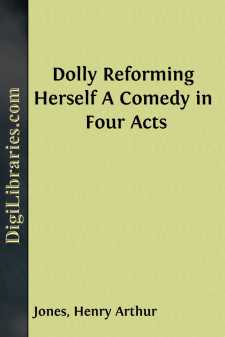Categories
- Antiques & Collectibles 13
- Architecture 36
- Art 48
- Bibles 22
- Biography & Autobiography 813
- Body, Mind & Spirit 142
- Business & Economics 28
- Children's Books 14
- Children's Fiction 11
- Computers 4
- Cooking 94
- Crafts & Hobbies 4
- Drama 346
- Education 46
- Family & Relationships 57
- Fiction 11829
- Games 19
- Gardening 17
- Health & Fitness 34
- History 1377
- House & Home 1
- Humor 147
- Juvenile Fiction 1873
- Juvenile Nonfiction 202
- Language Arts & Disciplines 88
- Law 16
- Literary Collections 686
- Literary Criticism 179
- Mathematics 13
- Medical 41
- Music 40
- Nature 179
- Non-Classifiable 1768
- Performing Arts 7
- Periodicals 1453
- Philosophy 64
- Photography 2
- Poetry 896
- Political Science 203
- Psychology 42
- Reference 154
- Religion 513
- Science 126
- Self-Help 84
- Social Science 81
- Sports & Recreation 34
- Study Aids 3
- Technology & Engineering 59
- Transportation 23
- Travel 463
- True Crime 29
Dolly Reforming Herself A Comedy in Four Acts
Description:
Excerpt
"The crescendo of quarrel is most skilfully and drolly arranged;— scene on classic lines boldly challenging and, what is more, maintaining comparison with Sheridan." Mr. A. B. Walkley—The London Times.
"This new play, by Mr. Henry Arthur Jones, at The Haymarket, is surely as good a comedy as he has ever written.
I should say, in evaluating Mr. Jones, that his greatest asset is his humor. We are grateful that Mr. Jones has that comfortable gift which prevents him from dancing on us—that gift of humor whereby he is content to take us just as we are.
No playwright is more joyously observant than Mr. Jones; and none observes more accurately, in the milieu that he has chosen. Other playwrights may create more salient and memorable figures. But none of them creates figures so lifelike as Mr. Jones.
Nor is any one of them so fine a craftsman. We are not made conscious of it while the play is in progress. From the very outset, we are aware merely of certain ladies and gentlemen behaving with apparent freedom and naturalness. It is only when the play is over that we notice the art of it. The verisimilitude of "Dolly Reforming Herself" is all the more admirable because the play is founded on a philosophic question, and in the whole course of it there is not a scene, not a character (not even the butler's character), that is not strictly and logically relevant to this question. The whole fabric is wrought in a tight and formal pattern, yet the effect of it is as life itself. The question in point is "Can we cure ourselves of our bad habits?" and the answer is worked not through a story, but simply through the behavior of a few people in a country-house.
The central scene of the play, however, is the scene between Dolly and her husband. The whole scene is delightful, worked out with the finest sense of dramatic rhythm: a truly great comic scene, of which Mr. Jones may well be proud."
Mr. Max Beerbohm—The Saturday Review.
TO MISS ETHEL IRVING
My Dear Miss Irving,
Will you accept the dedication of this little comedy, whose success at the Haymarket was so largely due to your fine and sincere performance of Dolly?
Faithfully yours
Henry Arthur Jones.
The following is a copy of the original cast of "Dolly Reforming Herself" produced at the Haymarket Theatre, on Tuesday, November 3rd., 1908.
CAST.
Harry Telfer (Dolly's Husband) Mr. Robert Loraine
Matthew Barron (Dolly's Father) Mr. C. M. Lowne
Captain Lucas Wentworth (Dolly's Cousin) Mr. Charles R. Maude
Professor Sturgess Mr. E. Lyall Swete
The Rev. James Pilcher (Vicar of Crookbury) Mr. Herbert Bunston
Criddle Mr. Gilbert Porteous
Mrs. Harry Telfer (Dolly) Miss Ethel Irving
Mrs. Sturgess (Renie) Miss Margaret Halstan
Peters (Dolly's Maid) Miss Ada Webster
Harry Telfer (Dolly's husband).
Matthew Barron (Dolly's father).
Captain Lucas Wentworth (Dolly's cousin).
Professor Sturgess.
The Reverend James Pilcher (Vicar of Crookbury.)
Criddle.
Mrs. Harry Telfer (Dolly).
Mrs. Sturgess (Renie).
Peters (Dolly's maid).
ACT I.
Scene.—The Drawing-Room at Harry Telfer's, The Gables, Crookbury Green, Surrey.
Time—The afternoon of 1st January, 1907.
ACT II....


